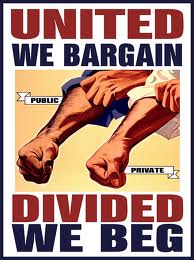If the decline of the union means that American companies begin hiring more people, I’m all for the decline of the American union:
Last July was a good month for factory workers in Anderson, Ind., where a Honda parts supplier announced plans to build a new plant and create up to 325 jobs. But it was a grim month in the Cleveland suburbs, where an industrial plastics firm told the state of Ohio it was closing a plant and laying off 150 people.
Nearly all of the Ohio workers belonged to a labor union. Workers at the Indiana plant don’t. Their fates fit a post-recession pattern: American factories are hiring again, but they’re not hiring union members.
But nationally, is there a trend that would suggest that union shops are doing better than or worse than non-union shops?
U.S. manufacturers have added a half-million new workers since the end of 2009, making the sector one of the few bright spots in an otherwise weak recovery. And yet there were 4 percent fewer union factory workers in 2012 than there were in 2010, according to federal survey data. On balance, all of the job gains in manufacturing have been non-union.
This isn’t rocket surgery. It’s been a fact for a long time now that unions are nothing more than modern day racketeer outfits. While they may provide better compensation for their members, they restrict the number of jobs that otherwise might have been available. Further, and perhaps more insidious, is the fact that the monies generated from their members goes straight into the hands of politicians.
Good riddance.

